
If you’ve been using Pinterest for a while, you may know that keyword research is very important.
Finding (and using) good keywords is crucial to helping Pinterest understand exactly what your pins are about, which then helps them to rank and distribute your pins to other users.
However, some keywords are just too popular and nearly impossible to rank for.
That’s where long-tail keywords come in!
Using long-tail keywords on Pinterest can be a great Pinterest strategy to help grow your reach and audience on the platform.
What are long-tail keywords? And how do you use them?
This post will show you exactly what long-tail keywords are and how to use them to (hopefully) see great results!
Let’s dive in.
Please note: Pinterest is always changing, and while I try my best to update my posts, not all information may be up to date. If you’re looking too see the most updated tips, strategies, and information, check out this resource page.
What are long-tail keywords?
Long-tail keywords are essentially specific keywords that stem from a broader keyword.
These keywords are generally a few words long and include a larger and more popular keyword.
Examples of long-tail keywords
Let’s look at some examples of these keywords.
For instance, take the popular keyword “makeup products.”
“Makeup products” is a very broad keyword. What type of makeup products? Makeup products for who? What price of makeup products? High-end or drugstore makeup products?
To make this keyword more specific, we can target a more precise and narrow area of makeup products.
Here are some possible long-tail keywords for this term:
- Makeup products for teens
- Waterproof makeup products for the summer
- Makeup products for girls with acne
- Affordable drugstore makeup product dupes
- Natural makeup products
You can go slightly specific or super specific — it’s totally up to you and what you think you’ll see the best results with!
Here’s another example with the term “dessert recipes.”
Some possible long-tail keywords for this term could be:
- 5-minute dessert recipes
- Low calorie dessert recipes
- Family dessert recipes for Christmas
- Quick and easy dessert recipes
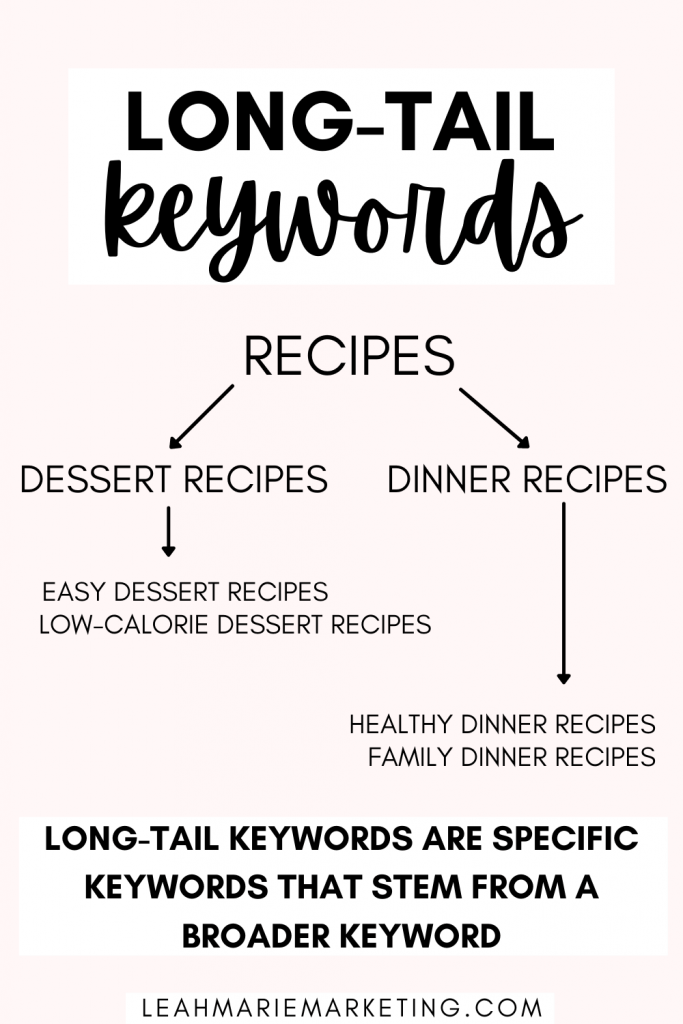
Why should you use long-tail keywords on Pinterest?
You may be thinking, how can you see good results by targeting super specific keywords? Isn’t it the large and popular keywords that see the best results?
The truth is, that’s definitely not always the case.
In fact, there are many reasons why I firmly believe that targeting long-tail keywords can be better than targeting broad keywords!
Here’s why:
- You often reach a more targeted audience and get more targeted traffic
When a user searches a more specific keyword, they likely really know what they’re looking for.
So, when they come across your pin, there is a pretty good chance that they’ll engage with it.
On top of that, more targeted traffic can help you to even build an email list, make product and affiliate sales, grow an engaged following, and more!
There are lots of benefits to targeted traffic.
- It gives Pinterest an even better idea of what your pin is about
If you use the keyword “recipes” or even “dessert recipes,” yes, Pinterest will understand that your pin is about recipes.
But, what type of recipes?
Cake recipes? Cookie recipes? Easy dessert recipes? Low-calorie dessert recipes?
If you get more specific with your keywords, oftentimes it can help Pinterest to better understand what your pin is about.
This can help Pinterest to distribute your pins to interested users and to rank your pins in searches.
- They usually aren’t as difficult to rank for
Think about how many times the keyword “recipes” is probably searched for each month. (Probably tens of thousands!)
Plus, think of many “recipes” pins there are on Pinterest. (My guess is that there are hundreds of thousands or maybe even millions!)
The odds of you ranking for an extremely popular keyword like that are pretty low. And the odds aren’t just low for you, they’re low for a majority of Pinterest users.
On the other hand, more specific keywords such as “easy Christmas party dessert recipes” are going to have far fewer pins created for that term.
In other words, in most cases, less people target specific keywords.
That means it will likely be much easier for you to rank for that term!
Yes, more specific keywords like this will also get less searches.
But, what’s better…
Not even ranking for a super popular pin (and getting little to no engagements) OR ranking for a less-popular keyword but consistently getting engagements.
I think the latter.
- They often provide consistent engagement, such as follows, outbound link clicks, saves, and more
Rankings can shift over time, but still, ranking for long-tail keywords can often give you consistent results!
For example, here is an example of one of my pins that ranked for a long-tail keyword. I got pretty consistent results with this pin for months!
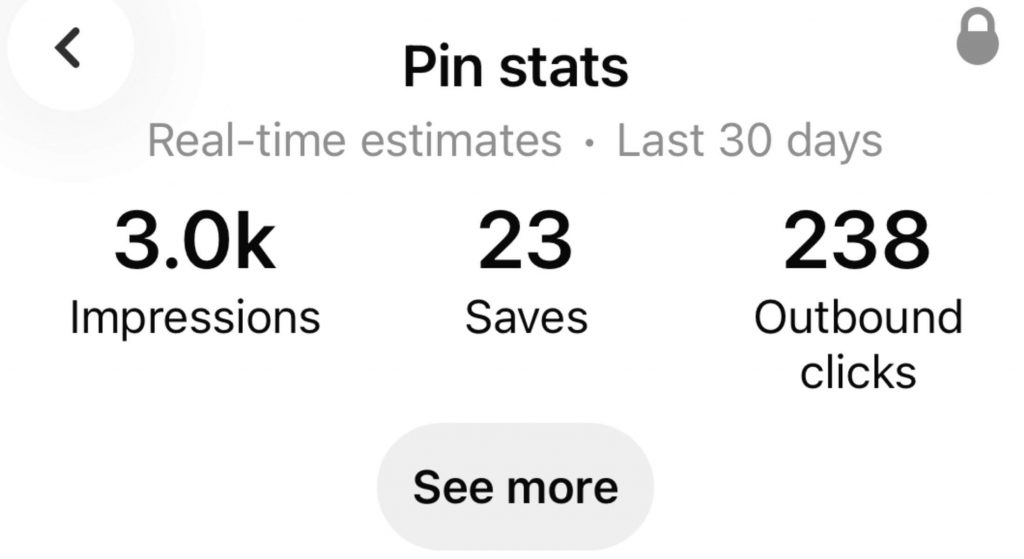
- It can scale your account and business growth
If you’re consistently creating content, targeting good keywords, and ranking (such as with my pin above), you can absolutely grow your Pinterest account or business!
That pin above was just ONE pin for ONE long-tail keyword.
Now, imagine ranking for 10…or 20…or even more!
Results are definitely possible with this Pinterest keyword strategy.
How to find long-tail keywords on Pinterest
In my Pinterest keyword research guide, I outline over 5 methods to find keywords right on Pinterest!
Although there are plenty of great Pinterest keyword research methods, there is one method that I think is by far the best one for finding long-tail keywords! (Plus, it’s super easy.)
This method is the Pinterest search keyword method.
Here’s how to use it:
- Open the keyword search bar
Note: Make sure that you are searching “All Pins.” Sometimes it defaults to “Your Pins.” To change this, click on the dropdown on the right side of the search bar and toggle to the “All Pins” option.

- Type in a keyword (don’t click search!)
It’s best to start with a more broad keyword, then go more specific as you get suggestions.
For example, you could start with “skincare tips” or “dessert recipes.”

You can find great keywords to start off with using one of the methods I outline in my Pinterest keyword research guide.
Plus, my free e-book, Pinterest Keyword Goldmine, will help you to find the best Pinterest keywords to SCALE your blog or business!
Get the free e-book below or click here to learn more!
- Look at the suggested terms of the guided search
Most times, when you type a keyword in, the guided search will suggest more keywords to follow it.
These are your long-tail keyword ideas!
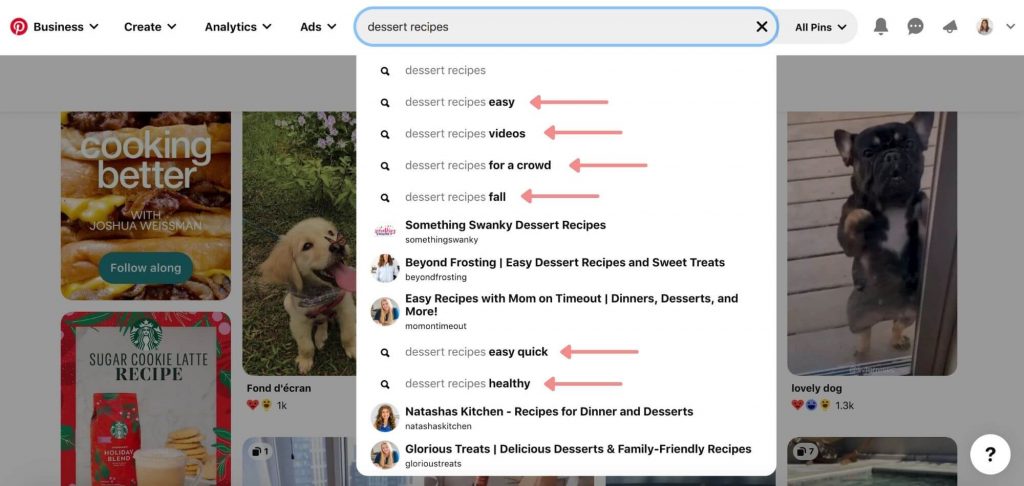
The great thing about this keyword research method is that these suggested terms are based on actual queries that people search! (Therefore, you know that they actually have an audience.)
You can continue to go more specific with your long-tail keywords by typing in more specific keywords.
For instance, take a look at what happens when I start with a more specific keyword:
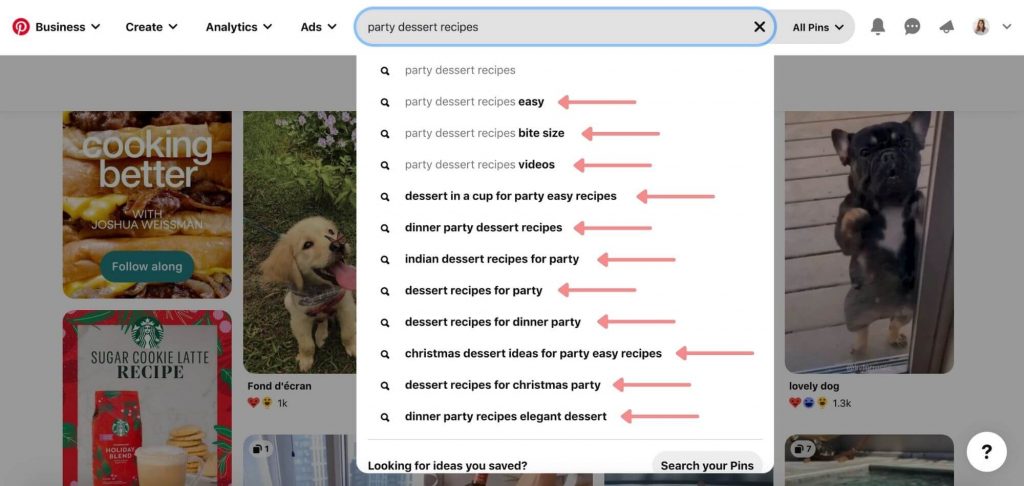
The long-tail keywords get more specific as well!
How specific should your long-tail keywords be?
There’s no exact criteria that determines how specific your keywords should be — it’s up to you.
The more specific you go, the more likely you are to be able to rank.
However, if you go way too specific, you may receive very little traction even if you do rank.
One thing that may help you is paying attention to the keyword search volumes. Keyword search volumes are a good indicator of how well a certain keyword might perform based on how many searches it generally gets.
This post on keyword search volumes will show you 4 methods and tools that will help you to see how many monthly searches that different keywords get.
This can be very useful in your Pinterest marketing and Pinterest keyword strategy!
Where do you put long-tail keywords on Pinterest?
On Pinterest, long-tail keywords can be used just like any other keywords!
They serve one large purpose: to tell Pinterest exactly what your pin is about.
You can do this through Pinterest SEO.
Pinterest SEO is the process of optimizing your Pinterest content with keywords to help the Pinterest algorithm understand what your pins are about and distribute and rank them accordingly.
There are essentially 3 main areas of Pinterest SEO:
- Profile SEO
- Board SEO
- Pin SEO
Related: Pinterest Board SEO: Complete Board Optimization Guide
All three of these types of Pinterest SEO work together to optimize your account.
My 29-step Pinterest SEO checklist will show you the best places to put your keywords to optimize your Pinterest account and hopefully see the best results possible.
If you want to know where to start, this may be a great (FREE) resource for you!
Conclusion
I hope that this post has helped you to understand what long-tail keywords are and how to find and use them on Pinterest!
Have you every used these on your Pinterest account? Let me know in the comments below!
If you want more valuable Pinterest information so you can skyrocket your success, read more on my blog or join my email list (I provide some of my MOST VALUABLE INFORMATION to my email list!)
I hope to see you around again soon. Thanks for reading!
Leah Marie
SAVE FOR LATER!

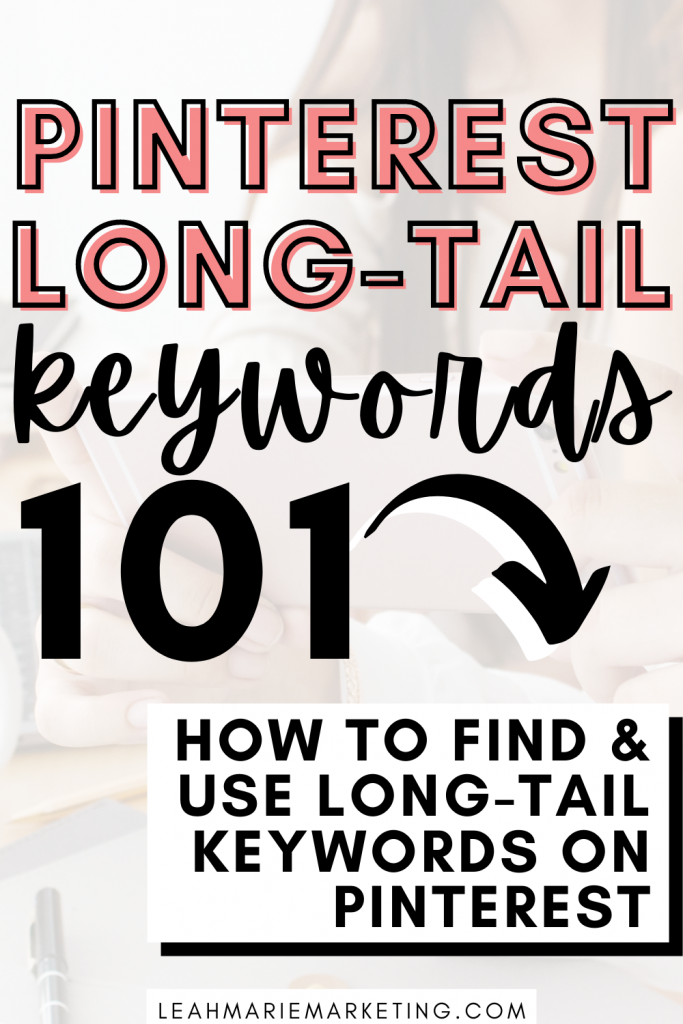




Hello Leah, It’s an amazing post about Pinterest keywords. I am a bit confused about this. In how specific your long tail keywords should be, you mentioned that if we choose way too specific keywords then we may receive very little traction. What does it mean?
I believe you refer to that people search less for the keyword “recipe” and more for a particular recipe “dessert recipe”. People search with a motive and they do not search for the main keyword. Please explain more about this.
So many thanks for this post.
Thanks
Hi! 🙂
Although long-tail keywords are more specific, you can still go even more specific with them. For example, “dessert recipes” is a broad keyword. “Chocolate chip cookie recipes” is a little more specific. “Chocolate chip cookie in a mug” is even more specific. “Chocolate chip cookie in a mug no egg” is even more specific. All of these keywords are searched for, but the more specific you get, often the less searches it will get. Because more specific keywords are often easier to rank for due to less competition, you will still likely receive some traction, but maybe not as much as the slightly broader keywords. However, if you get TOO specific to the point where almost no people are searching for that keyword, you probably won’t see great results.
In regards to the second part, people don’t usually just search “recipes” (at least I wouldn’t!). They usually search for a specific type of recipe (ex. “chicken recipes,” “dinner recipes,” etc.) that is more tailored to what they are looking for. This may be an example that just fits this topic, but in general, it’s important to consider the search/user intent for each keyword.
I hope this makes sense and helps!